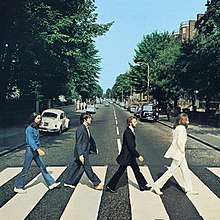Abbey Road
| Abbey Road | |||||
|---|---|---|---|---|---|
 |
|||||
| Studio album by The Beatles | |||||
| Released | 26 September 1969 | ||||
| Recorded | 22 February – 20 August 1969 | ||||
| Studio | EMI, Olympic and Trident Studios, London | ||||
| Genre | |||||
| Length | 47:23 | ||||
| Label | Apple | ||||
| Producer | George Martin | ||||
| The Beatles chronology | |||||
|
|||||
| The Beatles North American chronology | |||||
|
|||||
| Singles from Abbey Road | |||||
|
|||||
| Professional ratings | |
|---|---|
| Review scores | |
| Source | Rating |
| AllMusic | |
| The A.V. Club | A |
| Consequence of Sound | A+ |
| The Daily Telegraph | |
| Down Beat | |
| Encyclopedia of Popular Music | |
| MusicHound | |
| Paste | 100/100 |
| Pitchfork Media | 10/10 |
| The Rolling Stone Album Guide | |
Abbey Road is the eleventh studio album by English rock band the Beatles, released on 26 September 1969 by Apple Records. The recording sessions for the album were the last in which all four Beatles participated. Although Let It Be was the final album that the Beatles completed before the band's dissolution in April 1970, most of the album had been recorded before the Abbey Road sessions began. A double A-side single from the album, "Something"/"Come Together", released in October, topped the Billboard chart in the US.
Abbey Road is a rock album that incorporates genres such as blues, pop, and progressive rock, and it makes prominent use of the Moog synthesizer and the Leslie speaker. Side two contains a medley of song fragments edited together to form a single piece. The album was recorded amid a more collegial atmosphere than the Get Back/Let It Be sessions earlier in the year, but there were still frequent disagreements within the band, particularly over Paul McCartney's song "Maxwell's Silver Hammer". John Lennon had privately left the group by the time the album was released and McCartney publicly quit the following year. A 16-minute medley of several short songs comprise the majority of side two, closing with the lyric "and in the end, the love you take is equal to the love you make".
Although Abbey Road was an immediate commercial success and reached number one in the UK and US, it initially received mixed reviews, some critics describing its music as inauthentic and bemoaning the production's artificial effects. Many critics now view the album as the Beatles' best and rank it as one of the greatest albums of all time. In particular, George Harrison's contributions, "Something" and "Here Comes the Sun", are considered to be among the best songs he wrote for the group. The album's cover features the four band members walking across a zebra crossing outside Abbey Road Studios and has become one of the most famous and imitated images in the history of recorded music. As of 2011[update], Abbey Road remains one of the Beatles' best-selling albums.
...
Wikipedia
